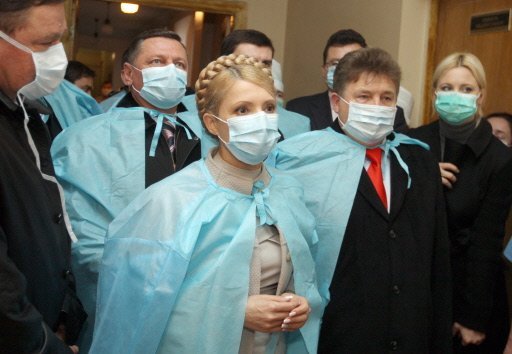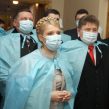
Will Flu Spoil Tymoshenko’s Election Campaign?
Publication: Eurasia Daily Monitor Volume: 6 Issue: 208
By:

A flu epidemic which recently erupted in Ukraine may derail the presidential election campaign. As the major parties try to use the epidemic to their advantage, the situation threatens to spiral out of control because the media hype is causing panic to spread faster than the virus. This may spoil Prime Minister Yulia Tymoshenko’s election chances. Not only is her government blamed for both spreading panic and failing to contain the virus, but also a state of emergency which may be introduced would mean the postponement of the elections scheduled for January 17, 2010 at a time when Tymoshenko is especially vulnerable due to a weak economy.
The behavior of the all-news Channel 5 during the past two weeks illustrates the panic that has gripped Ukraine. All news bulletins start with calls to wear face masks and reports about the flu spreading across the country. Tymoshenko grasped the opportunity to demonstrate her energy and zeal to potential voters early in the epidemic, gathering an extraordinary meeting of her government where she threatened to introduce “special regimes” so that Ukrainians would not travel across the country “without urgent need” and to punish drugstores for high prices (Ukrainska Pravda, October 30).
As the first regions where the epidemic started were put under quarantine, people rushed to drugstores to buy medicines and to street markets to purchase food, fearing that the markets would be closed due to the quarantine. It went as far as a rumor spreading across Ukraine that mysterious planes were pouring anti-flu substances over towns at night (Segodnya, Channel 5, October 30).
While the scale of the epidemic should not be underestimated since apparently in most cases Ukrainians are facing swine flu, the media hype has been excessive. Tymoshenko had to admit that there have been less flu cases and lower mortality from flu thus far in 2009 than, for example, in 2007 (UNIAN, November 9). However, early in the current outbreak she tried to use the situation for her advantage, holding televised extraordinary meetings with government ministers and regional governors and meeting planeloads of anti-flu medicines at airports at night, for which President Viktor Yushchenko did not spare criticism (Interfax-Ukraine, Ukrainski Novyny, November 9).
The epidemic eventually placed Tymoshenko at a disadvantage as a presidential candidate who chairs the government, so it is easy for her rivals to blame her for any mistakes. Ukrainians are inclined to blame the government for the shortage of medicines and for such inconveniences as the closure of schools and kindergartens for quarantine. Tymoshenko’s rivals know this, and they are fueling the fire. The Party of Regions (PRU), which is headed by Tymoshenko’s main election rival Viktor Yanukovych, has accused her of bringing thousands of people from west Ukraine for a mass rally, at which she was nominated for president in Kyiv on October 24, knowing that the epidemic in west Ukraine was in full swing; he demanded the dismissal of the emergencies and health ministers (Ukrainska Pravda, October 30). He also accused Tymoshenko of lobbying in favor of drugstores allegedly linked to Bohdan Hubsky, a businessman from her party (Hubsky denied this) (Ukrainska Pravda, November 5).
Yushchenko accused Tymoshenko of ignoring his calls for preventive measures against swine flu and instructed prosecutors to investigate the October 24 rally (Ukrainska Pravda, November 4). He even compared the rally to the government-organized rallies in Kyiv on May 1, 1986 after the Chernobyl disaster when the ruling communists did not inform the population about the possible consequences (Channel 5, November 4).
Yushchenko is apparently considering introducing a state of emergency over the flu crisis, which would entail rescheduling the presidential election. His aide Ihor Popov opined in a November 6 article in Ukrainska Pravda that if Tymoshenko failed to contain the epidemic it might be necessary to introduce a state of emergency. Popov recalled that no election may be held under a state of emergency, so in this case the presidential poll should be postponed. He suggested that the presidential election should coincide with local elections scheduled for May 30. Yushchenko may benefit if the election is rescheduled. Opinion polls have shown that his rating is still much lower than those of Tymoshenko and Yanukovych, but recently Yushchenko’s popularity has grown somewhat. As Yushchenko and Tymoshenko traditionally share the same electorate, he may take advantage of the epidemic in a last-ditch effort to increase his rating at her expense
Yushchenko is apparently undecided. On the one hand, he said in an interview on November 5 that there were no grounds for a state of emergency (Channel 5, November 8). On the other hand, his national security aide Raisa Bohatyryova backed Popov’s opinion (Channel 5, November 6). Yushchenko cannot introduce a state of emergency without parliament’s approval. He may receive it if the PRU backs him. PRU deputy Mykhaylo Chechetov suggested that the election postponement would have fatal consequences for Tymoshenko as a presidential candidate, because her cabinet would run out of money to pay pensions and wages to state employees in early 2010 (Segodnya, November 9). Chechetov may be correct, since the IMF threatened recently that it would withdraw its assistance to Ukraine until after the elections (EDM, November 4). The government has recently relied on IMF money to pay wages and pensions, as well as to pay for Russian gas.




